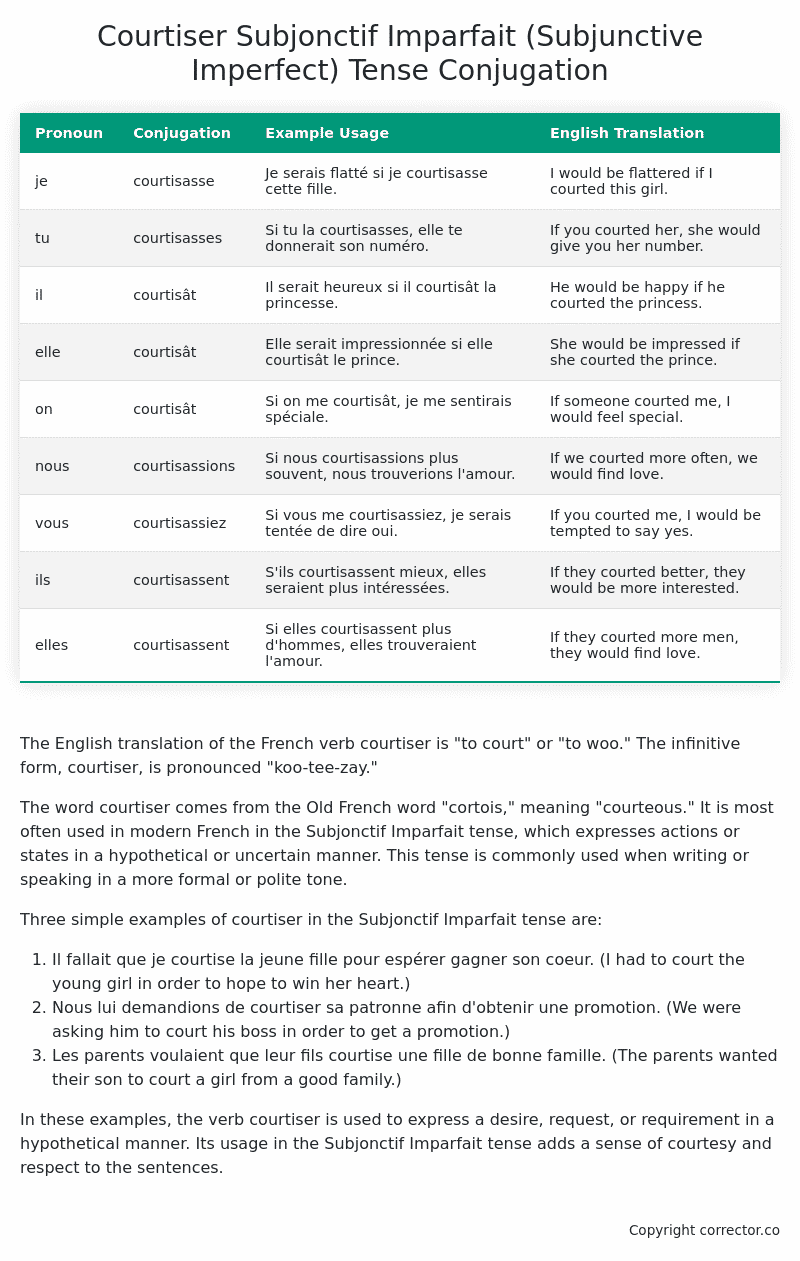Subjonctif Imparfait (Subjunctive Imperfect) Tense Conjugation of the French Verb courtiser
Introduction to the verb courtiser
The English translation of the French verb courtiser is “to court” or “to woo.” The infinitive form, courtiser, is pronounced “koo-tee-zay.”
The word courtiser comes from the Old French word “cortois,” meaning “courteous.” It is most often used in modern French in the Subjonctif Imparfait tense, which expresses actions or states in a hypothetical or uncertain manner. This tense is commonly used when writing or speaking in a more formal or polite tone.
Three simple examples of courtiser in the Subjonctif Imparfait tense are:
- Il fallait que je courtise la jeune fille pour espérer gagner son coeur. (I had to court the young girl in order to hope to win her heart.)
- Nous lui demandions de courtiser sa patronne afin d’obtenir une promotion. (We were asking him to court his boss in order to get a promotion.)
- Les parents voulaient que leur fils courtise une fille de bonne famille. (The parents wanted their son to court a girl from a good family.)
In these examples, the verb courtiser is used to express a desire, request, or requirement in a hypothetical manner. Its usage in the Subjonctif Imparfait tense adds a sense of courtesy and respect to the sentences.
Table of the Subjonctif Imparfait (Subjunctive Imperfect) Tense Conjugation of courtiser
| Pronoun | Conjugation | Example Usage | English Translation |
|---|---|---|---|
| je | courtisasse | Je serais flatté si je courtisasse cette fille. | I would be flattered if I courted this girl. |
| tu | courtisasses | Si tu la courtisasses, elle te donnerait son numéro. | If you courted her, she would give you her number. |
| il | courtisât | Il serait heureux si il courtisât la princesse. | He would be happy if he courted the princess. |
| elle | courtisât | Elle serait impressionnée si elle courtisât le prince. | She would be impressed if she courted the prince. |
| on | courtisât | Si on me courtisât, je me sentirais spéciale. | If someone courted me, I would feel special. |
| nous | courtisassions | Si nous courtisassions plus souvent, nous trouverions l’amour. | If we courted more often, we would find love. |
| vous | courtisassiez | Si vous me courtisassiez, je serais tentée de dire oui. | If you courted me, I would be tempted to say yes. |
| ils | courtisassent | S’ils courtisassent mieux, elles seraient plus intéressées. | If they courted better, they would be more interested. |
| elles | courtisassent | Si elles courtisassent plus d’hommes, elles trouveraient l’amour. | If they courted more men, they would find love. |
Other Conjugations for Courtiser.
Le Present (Present Tense) Conjugation of the French Verb courtiser
Imparfait (Imperfect) Tense Conjugation of the French Verb courtiser
Passé Simple (Simple Past) Tense Conjugation of the French Verb courtiser
Passé Composé (Present Perfect) Tense Conjugation of the French Verb courtiser
Futur Simple (Simple Future) Tense Conjugation of the French Verb courtiser
Futur Proche (Near Future) Tense Conjugation of the French Verb courtiser
Plus-que-parfait (Pluperfect) Tense Conjugation of the French Verb courtiser
Passé Antérieur (Past Anterior) Tense Conjugation of the French Verb courtiser
Futur Antérieur (Future Anterior) Tense Conjugation of the French Verb courtiser
Subjonctif Présent (Subjunctive Present) Tense Conjugation of the French Verb courtiser
Subjonctif Passé (Subjunctive Past) Tense Conjugation of the French Verb courtiser
Subjonctif Imparfait (Subjunctive Imperfect) Tense Conjugation of the French Verb courtiser (this article)
Subjonctif Plus-que-parfait (Subjunctive Pluperfect) Tense Conjugation of the French Verb courtiser
Conditionnel Présent (Conditional Present) Tense Conjugation of the French Verb courtiser
Conditionnel Passé (Conditional Past) Tense Conjugation of the French Verb courtiser
L’impératif Présent (Imperative Present) Tense Conjugation of the French Verb courtiser
L’infinitif Présent (Infinitive Present) Tense Conjugation of the French Verb courtiser
Struggling with French verbs or the language in general? Why not use our free French Grammar Checker – no registration required!
Get a FREE Download Study Sheet of this Conjugation 🔥
Simply right click the image below, click “save image” and get your free reference for the courtiser Subjonctif Imparfait tense conjugation!

Courtiser – About the French Subjonctif Imparfait (Subjunctive Imperfect) Tense
Formation
Common Everyday Usage Patterns
Interactions with Other Tenses
Subjonctif Présent
Indicatif Passé Composé
Conditional
Conditional Perfect
Summary
I hope you enjoyed this article on the verb courtiser. Still in a learning mood? Check out another TOTALLY random French verb conjugation!


